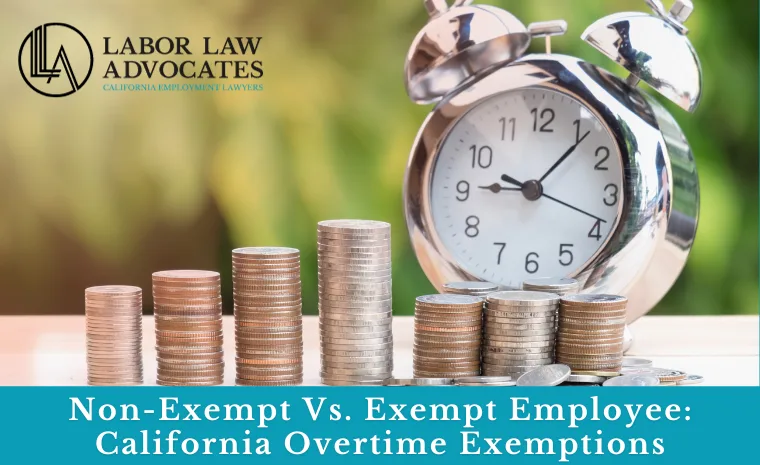In the realm of California employment, the distinction between a non-exempt vs exempt employee carries significant weight, especially when it comes to overtime payments. The Golden State boasts a rich tapestry of labor laws, and understanding these nuances is crucial for both employees and employers.
Throughout this blog, we will dissect the intricate web of California’s overtime regulations, shedding light on the essential differences between exempt and non-exempt employees, the governing laws, and the practical implications for your professional life in the state.
From San Diego to Sacramento, we aim to equip you with a clear understanding of the employment laws unique to the Golden State. Join us on this journey as we demystify the complexities of California’s overtime laws.
Exempt vs Non-Exempt Employees California
To grasp the essence of California overtime regulations, it is crucial to discern the fundamental differences between a non-exempt vs exempt employee. These classifications are primarily associated with the Fair Labor Standards Act (FLSA) and California labor laws, which dictate how employees are compensated for their time and work.
Let’s dive deeper into what these designations mean:
Non-Exempt Employees
Non-exempt employees are typically eligible for overtime pay under both federal and state law. They are not exempt from the overtime provisions of the FLSA protections. The key characteristics of non-exempt employees include:
- Overtime Eligibility: Non-exempt employees are entitled to receive money through overtime pay for hours worked beyond the 40-hour workweek. In California, they also receive overtime pay for work beyond 8 hours.
- Minimum Wage Protection: Non-exempt employees are protected by the California minimum wage laws, ensuring they receive at least the minimum hourly wage set by federal or state regulations.
- Record-Keeping: Employers must maintain accurate records of non-exempt employees’ hours worked, including start and end times, meal and rest breaks, and overtime hours.
- Meal and Rest Breaks: Non-exempt employees are entitled to rest and meal breaks as mandated by California state law. Failure to provide these breaks may result in penalties for employers.
- Pay for All Hours Worked: Non-exempt employees must be paid for all hours worked, including time spent on tasks before or after their scheduled shifts.
Exempt Employees
Exempt employees, on the other hand, are exempt from certain provisions of the FLSA and do not qualify for overtime pay. The primary characteristics of exempt employees include:
- Salary Basis: Exempt employees are typically paid a fixed salary regardless of the number of hours worked. They receive the same salary basis each payroll period.
- Job titles: Exempt employees perform specific job duties that fall under specific exemptions, such as executive positions, administrative duties, or technical computer employee exemptions outlined in the FLSA.
- Exemption from Overtime: Exempt employees are not eligible for overtime pay, even if they work more than 40 hours in a workweek or 8 hours in a day in California.
- Exemption Criteria: Exempt status is determined based on job duties, salary level, and other criteria outlined in labor laws. Meeting these criteria is essential for maintaining exempt status.

Recent Changes in California Labor Laws
California has a history of enacting progressive labor laws to protect the rights and well-being of employees. In recent years, several important changes have been made to state labor laws, affecting the regulations surrounding non-exempt and exempt employees. Here are some of the notable changes:
Overtime for Agricultural Workers
Effective January 1, 2019, California extended overtime pay protections to agricultural workers. Under this law, agricultural employees receive money through overtime pay at one and a half times their regular pay rate for any work beyond 8 hours in a workday or 40 hours in a week. This protection gradually phases in, with lower overtime thresholds and higher wage rates for smaller agricultural employers, allowing them more time to comply.
Minimum Salary Increase for Exempt Employees
California often adjusts the minimum salary requirements for exempt employees to keep pace with the state’s cost of living. The most recent update, effective January 1, 2022, raised the minimum annual salary for exempt employees. For employers with 25 or fewer employees, the minimum salary is set at $980 per week, or $51,080 annually. For employers with 26 or more employees, the minimum salary is $1,120 per week, or $58,240 annually.
Exemptions Based on COVID-19 Pandemic
During the COVID-19 pandemic, California introduced several exemptions to labor laws, including overtime regulations, to address the unique challenges brought about by the crisis. These exemptions allowed for flexibility in work hours and pay for specific essential workers and healthcare employees. While these changes were temporary, they demonstrated the state’s ability to adapt labor laws to unforeseen circumstances.
Daily Overtime Pay for Home Health Care Workers
Effective January 1, 2021, California introduced daily overtime pay for home health care workers. Now, home health care workers are entitled to overtime pay at one and a half times their regular rate for hours worked beyond 9 in a workday and double their regular rate for hours worked beyond 9 on the same workday.
Both employers and employees in California need to stay updated on these labor law changes, as they have a direct impact on compensation structure, working conditions, and compliance. These changes reflect California’s commitment to ensuring that workers are fairly compensated and protected, especially in challenging and rapidly evolving work environments.
As labor laws continue to evolve, consult with legal experts to ensure that your understanding of overtime regulations remains in compliance with the most up-to-date California labor laws.
Ensuring Fair Treatment in the Workplace
Ensuring fair treatment in the workplace is a cornerstone of a healthy and productive professional environment. It not only upholds the values of equality, respect, and justice, but also significantly impacts employees’ financial well-being.
Key principles to achieve this include providing equal opportunities and prohibiting discrimination based on factors like race, gender, age, religion, disability, and sexual orientation. Equitable pay for equal work ensures that employees receive just compensation regardless of their background or identity, directly impacting their financial stability.
Furthermore, preventing harassment and bullying, while fostering respect and civility, not only safeguards employees’ emotional well-being but also plays a crucial role in their overall job satisfaction. Compliance with labor laws, including the FLSA regulations, is essential to guarantee eligibility for overtime pay.
Overtime protections ensure that employees are fairly compensated for their extra hours of work, which is particularly significant for non-exempt workers whose earnings can substantially increase with overtime pay. Understanding and adhering to state and local labor laws is equally vital, as they can vary widely and directly impact how the overtime rate is calculated and awarded.
We’re Here to Ensure Your Workplace Equity
In complex cases where disputes arise concerning overtime pay and employee classification, particularly on being non-exempt vs exempt employee in California, seeking legal assistance and employee advocacy becomes crucial. Employees can benefit from the expertise of an employment attorney who specializes in overtime requirements and advocates for their rights in the face of any injustices or violations.
If you’re facing issues related to unpaid overtime, employee classification, or any other labor law concerns, our team at Labor Law Advocates is here to help you navigate the complexities and ensure your workplace rights are protected. We’re committed to fighting for fairness and justice in the workplace.
How We Can Assist:
- Unpaid Overtime Wages: Our experienced advocates will work tirelessly to ensure you receive the overtime pay you’re entitled to. We’ll review your situation, assess your eligibility, and take action to recover any unpaid wages.
- Employee Classification: If you believe you’ve been misclassified as an exempt employee, we will investigate your actual job duties, employment contract, and wage structure to ensure that your classification aligns with labor laws.
- Legal Expertise: With our in-depth knowledge of labor laws, we can provide you with the guidance and support needed to address your specific concerns.
Take Action Today!
Don’t let workplace injustices go unaddressed. If you’re ready to fight for your rights, give our employment lawyer a call now. Our dedicated team is here to advocate for you, protect your interests, and help you secure the fair treatment you deserve. Your first consultation is free, so take that important step towards workplace fairness today.




